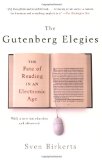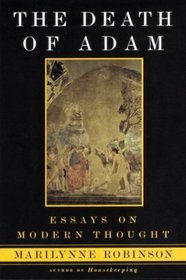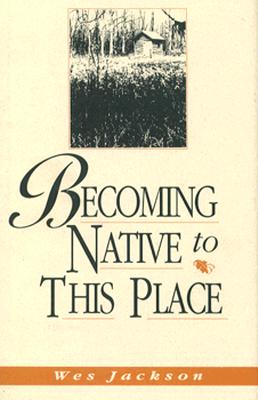The Gutenberg Elegies
How shall we characterize [reading]? What is it that separate reading acts share that lies beyond the local construction of setting, characters, and narrative circumstances? Is there a fundamental and identifiably constant condition that we return to over and over, one different from all other conditions, from being asleep, from being high, from daydreaming?
I think there is — certainly for me. But years of working in bookstores have convinced me that this fundamental condition is there for others as well — not just a specific inner state, but a need for getting back to it. Readers know it and they seek it out. I study people in the aisles of bookstores all the time. I see them standing in one place with their necks tilted at a forty-five degree angle, looking often not for a specific book, but for a book they can trust to do the job. They want plot and character, sure, but what they really want is a vehicle that will bear them off to the reading state. (Sven Birkerts)
The pages of The Gutenberg Elegies: The Fate of Reading in an Electronic Age are filled with passages like these. They manage to put a finger precisely on something I feel to be true but have never heard said so well. Birkerts takes reading as his subject, and writes about it compellingly enough to leave me reflective and troubled about our collective step “out of an ancient and familiar solitude and into an enormous web of imponderable linkages. We have created the technology that not only enables us to change our basic nature, but that is making such change all but inevitable.”
I’ve never read such a brilliant meditation on what makes reading distinctive. I’m not talking about the lists of virtues we’re familiar with. I’m talking about perceptive, thorough description of what occurs in us when we read, written in prose that’s vivid and engaging and unfailingly equipped with the categories to take any half-developed hunches we may have had on the subject, and carry them all the way to the end.
As the title promises, this book is an elegiac consideration of what happens to books in an electronic age. Under this heading it covers a lot of ground. There’s no way I can summarize without oversimplifying, but I can offer an incomplete sampling of the subjects addressed:
- privacy, memory, reflection
- the linearity and sequential logic of the book vs. interactivity and hypertext
- how the medium affects the message in literary art
- how the means affects the end
- otherness
- the explosion of data vs. the defining boundaries of the disciplines
- wisdom vs. expert accessing of information
- how modern literacy stacks up with the past
- deconstruction and multiculturalism and the decline (or death) of the author and all forms of author-ity
- the subversiveness of reading
Birkerts writes, especially in the early chapters, with a digressiveness that might have bothered me except that even his digressions are fascinating. He speaks of the physical book with a reverence I couldn’t completely relate to. Early on, he offers a chapter of reading autobiography that helps to define the significance books and reading have had for him, and I can only partly relate. I’ve always loved reading, and I prefer the book to cyberspace. But Birkerts’ comments make me feel I’ve been downright half-hearted about it at best, doctorate in English notwthstanding. And there are a few points in the argument at which I felt skeptical — more sanguine, and not quite ready to accept the grim worst-case-scenario.
But the chapters that examine the reading act, and that contrast the kinds of mental and even soul-making (borrowing a term from Keats) activity that belong to reading with those encouraged in an information age, have been deeply affecting for me. (One reader said the book had affected him at “a subatomic level.”) I’ve never read anything that opened my eyes more to all that happens when we read, and all the implications of the kinds of media we read. If indeed the book is in decline, this one puts up quite a fight. I’ve recognized the possibility before that we live in a crucial age when our technology gives us the power to have an impact incalculable to earlier generations. After reading The Gutenberg Elegies I’m convinced beyond a doubt. I recommend it highly for anyone who wants to be more awake and aware in a historic moment when much is at stake.



